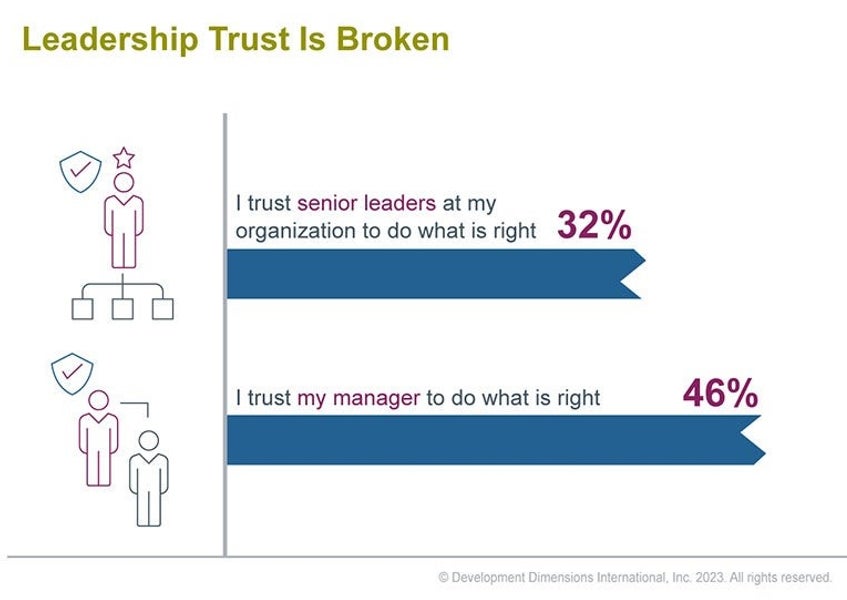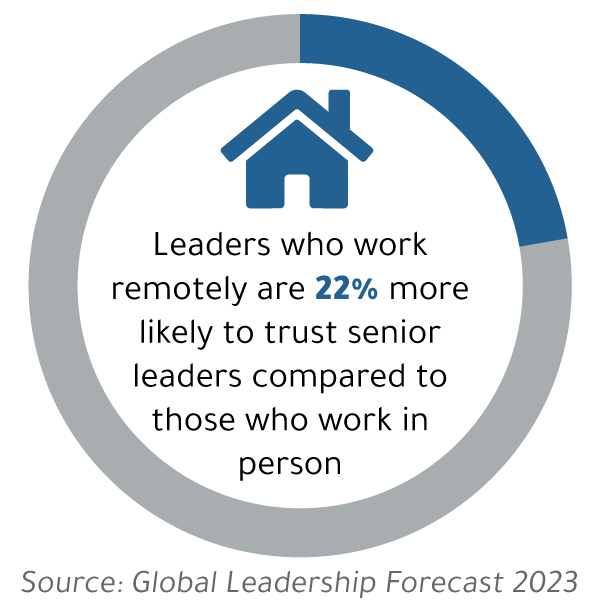Every year we create a list of leadership trends shaping up to impact the workplace in the year ahead. But this year is a little different. While I’ll share a short list of the key leadership trends for 2024, a human theme strongly underlies it, and is becoming more critical than ever: building trust.
The pace of change has become difficult to keep up with. Not only is there increased pressure and change at work, but there is also increasing global unrest and uncertainty.
In times that can feel destabilizing, we need stability in the people around us. We want leaders to have a strong vision for the future. We need to be able to trust that leaders will do what they say they will do.

But trust is on thin ground. According to our Global Leadership Forecast 2023 (GLF), less than half of leaders trust their own manager to do what’s right. And less than a third say they trust senior leaders in their organization.
Furthermore, as shown in a recent survey by PWC, executives significantly overestimate how much they’re trusted, both by customers and employees. The same executives also say the biggest challenge to building trust is company culture. In fact, only 34% of employees said the leaders of their company gave appropriate attention to earning trust.
That’s why the 2024 leadership trends are about more than the compounding issues facing leaders. It’s about building a culture and environment of trust that people can count on.
As we continue our research in 2024, we expect to see numbers about trust drop, unless organizations make serious investments in their leaders to address four key trends.

Trend #1: Generative AI (GenAI)
The economic possibilities of Generative Artificial Intelligence are profound. But so are people’s fear and anxiety.
Many employees already fear that AI could push them out of their jobs, or that they won’t be able to keep up in an AI-driven workplace. They may also worry about how their employers could be using AI to track them. For instance, is my employer secretly making decisions about my job performance or potential for promotion, without me knowing about it? And they may be concerned about the overall impact of their company using AI. Are we using AI ethically? Are we communicating to customers about how we’re using AI?
Leaders in every part of the business—from tech to sales to marketing to finance and more—will need to grapple with the ethical use of generative AI.
Amid this uncertainty, it will become more critical that employees trust their leaders, especially senior leaders.

Trend #2: Hybrid Work and Return to Office
CEOs say that employee engagement and retention are their top business concerns. Yet, we see a growing gap between executives and their employees on returning to in-person work. This demonstrates that leaders at the top are not connecting with employees to understand what incentives could retain them.
Many company leaders have cited the importance of collaboration, feedback, and teamwork as reasons behind the push toward in-person work. Yet many workers question whether it’s really a matter of their bosses not trusting them to be productive at home. This, in turn, deteriorates their trust in leaders.
Furthermore, employees may feel betrayed if they made significant life and financial decisions (such as relocating or changing childcare arrangements) based on company communications that remote work would continue. Reversing these policies, especially in short time frames and with little communication, creates a major breach of trust.
To increase collaboration and in-person attendance, executives should spend more time with frontline workers and gain an understanding of what matters to them. And they need to consider what actions and policies will drive the results they are after.

While some companies experience benefits by bringing workers back to in-person work, others may thrive with remote work. Our research found that leaders who work remotely are 22% more likely to trust senior leaders compared to those who work in person.
If company leaders are thinking about in-person/remote work policies, they need to have a clear strategy for how they intend to build and maintain trust. They need to be consistent with previous communications. They also need to clearly explain why they are making changes.

Trend #3: Diversity, Equity, and Inclusion (DEI)
Another key issue and trust breaker for employees has been the lack of follow-through on Diversity, Equity, and Inclusion (DEI) efforts. In 2020, there was a significant increase in companies making bold statements about their commitment to DEI. However, many have shied away from or outright abandoned those commitments in the past year.
According to our research, leaders who endorse their company’s DEI efforts decreased by 18%. We also saw a drop-off in leaders who are women or from underrepresented groups.
There are a lot of reasons why diversity programs fail. But it is not uncommon to observe a disconnect between DEI and other efforts to develop employees and influence culture, especially when it comes to leadership development.
As we look to 2024, we believe forward-thinking companies will make larger efforts to integrate DEI into everything they do, including leadership training.

Trend #4: Political Unrest
Global conflicts are increasingly part of employees’ everyday concerns. These concerns may weigh heavily on employees’ minds, especially if they have a personal connection to regions where conflicts occur.
In addition to global unrest, a presidential election year in the U.S. will bring highly polarized feelings to the workplace, with potential for interpersonal conflict. Trust in institutions erodes when there’s significant polarization.
Leaders have a tough job of trying to address how these challenging issues affect their teams’ day-to-day life, without imposing their own views on others.
While some leaders may wish they could ban “political” talk from the workplace, it’s not realistic. Nor does it help to build trust and engagement among their teams, who may feel silenced and unable to express themselves.
Rather, leaders should focus on showing empathy and creating healthy boundaries for discussion. Those boundaries should include an insistence on showing respect for one another. Leaders should encourage people to be genuinely curious and ask questions to understand strong feelings. At the same time, leaders need to recognize and address any inappropriate comments.
What Leaders Need to Do Differently in 2024 to Build Trust
These four leadership trends for 2024 represent some of the many challenges and opportunities facing leaders in the year ahead.
Every company is figuring out how to transform in 2024. But no matter what their strategy is in the face of these challenges, it will be more crucial than ever for leaders to build trust.
As famed business executive and author Seth Godin once said, “Earn trust, earn trust, earn trust. Then you can worry about the rest.”
Here are four ways leaders can build trust in 2024:
- Focus on building psychological safety to express concerns. This is especially important in addressing DEI and political unrest.
- Foster innovation through involvement. Invite team members to become part of the solution to deal with these new and difficult challenges to build trust. Doing this also helps companies generate better solutions.
- Make inclusion a habit. Inclusion should not be designed as a separate initiative, unrelated to the rest of the business. It needs to be the way leaders operate daily.
- Share thoughts, feelings, and rationale behind decisions. One of the Key Principles we teach every leader advises that leaders can build trust by sharing the “why” behind what they do. Understanding rationales can help employees understand and become advocates for change.
The Biggest Leadership Trend in 2024 Will Be Trust
As we look to 2024, all of these workplace and world tensions are creating a perfect storm of volatility. And the only way for leaders to beat it will be by building trust.
Whether choosing how to implement AI, resolving team conflict, or changing the nature of work, leaders who prioritize building trust will better retain, and capitalize on, the talent they need to drive success for the future.
Learn more about DDI’s leadership development solutions.
Read our blog on 2025 leadership trends.
Stephanie Neal is director of the Center for Analytics and Behavioral Research (CABER). She leads market and trend research focused on leadership and business innovation and is the general manager and lead author of DDI's Global Leadership Forecast.
Topics covered in this blog

